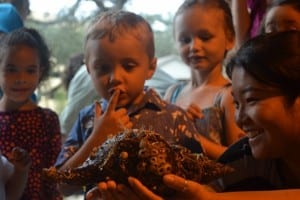UCF’s Littlest Knights Dive Into Ocean Day
 Future marine biologists sharpened their communication skills Wednesday while pre-schoolers learned about sea creatures during UCF’s annual Ocean Day activities.
Future marine biologists sharpened their communication skills Wednesday while pre-schoolers learned about sea creatures during UCF’s annual Ocean Day activities.
Twelve students in Linda Walters’ marine biology lab and marine biology class visited the Creative School on campus to teach children about sea creatures and those found in Florida waterways. Walters has been working with the Creative School on this project and others for several years.
The Creative School offers an accredited program for children ages 2 through 5. Ocean Day is one of the themed days the school celebrates during the year to help children learn hands-on about the world.
Children played games to help identify animals such as dolphins, jellyfish and whales. They also watched a skit about the consequences of dumping non-native fish into local rivers.
“They eat everything, and there will be no more anything left, ” said 4-year-old Jordan. “That’s not good.”
But the highlight of the morning was a trip to the touch tanks that the students brought from Walters’ lab. There were hermit crabs, different kinds of sea snails, sponges and horseshoe crabs among other creatures. The children were encouraged to touch, ask questions and learn about the “cool creatures” found in the state. Some children had never seen any of these creatures before and many were in awe.
“We’ve given all the animals names from the cartoon show SpongeBob SquarePants,” said Samantha Yuan, a graduate student in Walters’ lab. “It helps the kids connect and helps them not be afraid.”
Some children eagerly dropped their hands into the tanks. Others needed some convincing, especially when one of the sea snails squirted water at one boy.
The program was only the first stop for the team of student educators. The show-and-tell for children headed for the Harbor House Shelter next and later in the month the biology students will present at a public school.
“The goal is to help educate children about our wonderful resources and the need to take care of them while giving our future scientists an opportunity to learn how to effectively communicate with the general public,” Walters said.
